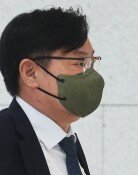Probe into ‘THAAD reporting’ causes suspension of deployment of 4 launchers
Probe into ‘THAAD reporting’ causes suspension of deployment of 4 launchers
Posted June. 06, 2017 06:59,
Updated June. 06, 2017 07:03
Announcing the result of its probe into omission of four missile launchers for the Terminal High-Altitude Area Defense anti-missile system on Monday, the presidential office said it confirmed that Wi Seong-ho, head of the defense policy office at the Defense Department, had instructed his staff to delete wordings including the location of the storage housing the launchers from the initial draft of the ministry’s report. As a result, Wi has been excluded from duty and subjected to an additional probe. The presidential office said it found circumstantial evidence that the Defense Ministry attempted to avoid an environmental impact assessment of the land for the THAAD system, which led President Moon Jae-in to instruct his staff to inspect how it happened. The controversy over omission of the four launchers from reporting to the new administration is thus effectively shifting to a probe into dodging of environmental impact assessment.
The presidential office’s announcement is a result of its inspection, and came six days after President Moon instructed the senior presidential secretary for civil affairs to investigate the case, calling it “very shocking.” Initially, the presidential office decisively claimed, “The Defense Ministry intentionally omitted the matter from its reporting to the new government,” sparking controversy over alleged mutiny or breach of state discipline. However, the latest investigation has not confirmed whether the omission was intentional or not. In fact, given the fact that one full THAAD system is composed of six missile launchers and that the media already reported the introduction of four additional launchers into South Korea, the leadership of the military had no reason to intentionally conceal it. This debacle has resulted from the military’s practice of excessive confidentiality and from confusion in communications that was caused by distrust between the outgoing and incoming governments’ diplomacy and national security teams. The presidential office may as well reflect upon the case anew to rethink whether it needed to cause such a big fuss out of the matter in the first place.
The situation has lasted only for six days, but controversy over THAAD reporting has caused unnecessary costs ranging from dispute over factuality between the National Security Office and the Defense Ministry, to diplomatic disharmony between South Korea and the U.S. In particular, there is no denial that the fuss has negatively affected the South Korea-U.S. alliance, which is the backbone of national security on the Korean Peninsula. The South Korean government has emphasized that the probe is not meant to reverse the earlier decision (on THAAD deployment) or to convey a different message, but U.S. Senator Dick Durbin even told President Moon during his visit to Seoul that if South Korea does not want, the U.S. could use the THAAD budget for other purposes.
Apart from omission in reporting, the presidential office is raising issue with the ministry’s attempted avoiding of environmental impact assessment on the THAAD site. The presidential office claims that the defense ministry intentionally restricted the area for THAAD deployment to some 320,000 sq. meters instead of 330,000 sq. meters, a size that is subject to strategic environmental impact assessment, and thus had the site only subject to small scale environmental impact assessment. On this matter, President Moon instructed his administration to conduct proper environmental impact assessment. While strategic environmental impact assessment that takes more than a year is conducted, the process to deploy THAAD will inevitably be suspended completely. For this reason, critics doubt that the omission of the four missile launchers from the ministry’s reporting was merely an excuse meant to delay THAAD deployment.
Furthermore, Kim Ki-jeong, second vice chief of the National Security Office, was sacked on Monday due to controversy over his behaviors while serving as Yonsei University professor. Since Kim, an official who was tasked with preparing for the upcoming Seoul-Washington summit scheduled in late this month, has been dismissed due to the presidential office’s failure to screen his eligibility, the National Security Office is effectively facing a major crisis of trust that has gone from bad to worse. With THAAD deployment set to be delayed, the new administration may be able to earn time to seek diplomatic resolution that President Moon pledged. However, controversy over the need for parliamentary ratification will further heat up in the political circle, and coordination of differences in views with Washington will also be a daunting task. More urgently, despite the North’s intensifying provocations with missiles, Seoul has no response measure whatsoever as to how to counter such provocations. If controversy over justification and transparency that the new administration is emphasizing only escalates further, who will be able to take responsibility?
Headline News
- Med professors announce intention to leave hospitals starting Thursday
- Bridge honoring Sgt. Moon Jae-sik unveiled in Pennsylvania
- Chief of Staff Chung tells presidential secretaries to stay away from politics
- US FTC bans noncompete agreements
- N. Korea launches cyberattacks on S. Korea's defense companies







